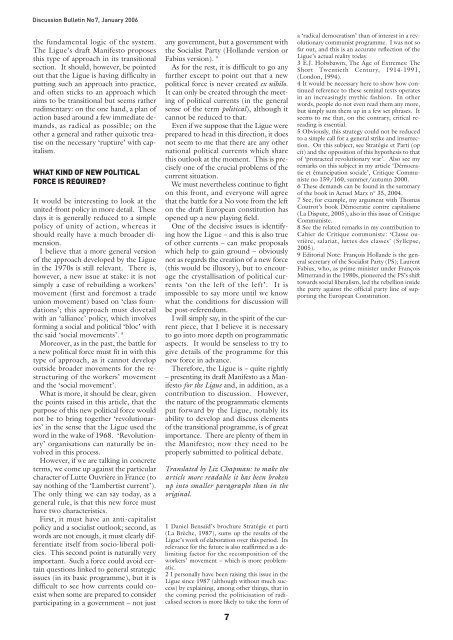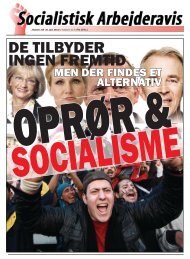Discussion Bulletin No7, January 2006ements such as feminism or ecology. Infact, the Ligue started working on theseissues as early as the 1970s (feminismmore than ecology).If we talk about strategy, we are talkingabout other things: aspects of positioning(in the general sense of the term)which allow us to express the currentstruggles with a view to emancipationthrough a rupture with the capitalistsystem. Although it is already possibleto put forward some ideas in this area,significant advances can only be made onthe basis of broad social experimentation,of founding experiences in the developmentof class struggles.THE LIGUE HAS LOST ITSREVOLUTIONARY STRATEGYJust because we are talking about rethinkingstrategy does not mean that it ispossible to completely wipe out the past.Each person must approach the task inthe light of their own history. With thisin mind, the approach taken by theLigue to its Manifesto project constitutesan interesting example, just as the latestissue of Critique Communiste (no 175)sheds some light on the problems encountered.First of all, this requires renewed discussion– although without necessarilyresolving everything – of all the programmaticelements in the Ligue’s revolutionarycommunist tradition: fromcertain fundamental elements (democracy,the state, wage labour, etc) to ‘thesocialism we want’, to borrow the titleof a former LRC Manifesto.However, this also requires us torecommence work on what the Liguehas traditionally called a ‘transitionalprogramme’ and the way in which thisaligns with the strategic plan to overthrowthe capitalist system.The difficulties arise at this final level.It is certainly possible to make progressin identifying transformational goals(transitional goals); although there aresome problems at this level, I will dealwith those later. On the other hand, it isvery difficult to align this approach witha genuine strategic plan to overthrow thesystem.In the past, this was what identified theLigue as a revolutionary organisation:not the fact that it asserted the simple necessityof the revolution, but the fact thatit put forward a strategic hypothesis ofrevolutionary struggle for power and theoverthrow of the system.Without going into detail, the Liguecalled this strategic hypothesis ‘the insurrectionarygeneral strike’. 5 Obviouslyit is possible to dispute this, but it didexist and was relevant to the strategies ofother political bodies. You only need toread the draft Manifesto (chapter 9,point 1) to become aware that while itmentions the necessary ‘revolutionaryrupture’, it merely cites a few generalprinciples rather than reaffirming the hypothesisof the ‘insurrectionary generalstrike’ or formulating a new strategic hypothesis.The Ligue has thus been robbed ofprecisely that which previously enabledit to define itself as a revolutionary organisation:a strategic approach to thestruggle to seize power.This is not the result of inadequaciesin drawing up the approach, but fundamentallyof the effects of the new historicalperiod in which we find ourselves:significant advances on these issuescannot be made without seminal experiencesrelating to the class struggle. Irepeat, this does not mean that weshould forget all the experiences of thepast. On this subject, the passage of theManifesto which I have cited, on the‘revolutionary rupture’, reaffirms a fewgeneral principles related to the historyof the revolutionary communist tradition(and I agree with two or three of thestatements). However, this is in no waya revolutionary strategy. It is better tostate this than try to hide it.It would be interesting to look in passingat how organisations which have abroadly similar history to the Ligue dealwith this question.Naturally I am not referring to thosewhich take the form of sects, but thosewhich have genuine interaction with theoutside world and activism. One exampleis the SWP in the United Kingdom. Thisorganisation is, shall we say, very keen toassert its revolutionary identity, and willdrag Lenin or Trotsky into the mostminor of political debates.Having said that, Alex Callinicos, oneof its main leaders, recently published abook (An Anti-Capitalist Manifesto)which ends with a rather startling programmefor transition. It involves 11 immediateminimum demands, whosetransitional effect is not all that clear,which touch only vaguely on capitalistproperty relations and do not deal at allwith political power. 6In comparison with A Callinicos’s 11-point proposal, the joint governmentprogramme signed by the <strong>Socialist</strong> andCommunist parties in the 1970s was resolutelyanti-capitalist!This is a politics of a big gap betweenthe more or less radical immediate demands,and the revolutionary outlook assertedby the party, which must thusstand by it. By struggling for these socalled‘transitional’ demands, the massesare not aware that they are involved in aprocess of revolutionary rupture with6capitalism (how could they know it,given the nature of the demands?) butthe revolutionary party itself is aware ofit…RE-FORGING A TRANSITIONALPROGRAMMEI believe a different approach is needed.It is not possible to define a new strategicrevolutionary hypothesis ‘in camera’(with no social experimentation) but itis possible to work on the formulationof transitional goals, both by workingfrom past experience and by taking currentstruggles and their dynamics as afulcrum.It would be necessary to hold a specificdiscussion to identify the goal oftransitory programmes. It is not a caseof putting forward objectives which willmake the masses aware of the need tobreak with the system, but rather of suggestingobjectives involving radical transformationof the system, thus allowing‘the masses’ to make progress towardsoverthrowing the system through theirexperience of the transformation of socialrelationships. Therefore, this meanschanging both ‘objective’ and ‘subjective’conditions.Seen from this angle, the current situationis radically different from the1930s, which saw the development ofthe Fourth <strong>International</strong>’s TransitionalProgramme, as well as from the post-1968 period. This is why I use the word‘re-forging’. In my opinion, effortsshould be focused on two main areas.First, the radicalisation of democracy,on the theme of ‘democracy in its purestform’, on both the political and economicfronts.Second, the struggle against the commodificationof the world, from twomain angles: the struggle for the decommodificationof the workforce, and astruggle for the defence of public serviceswhich can be expanded to cover thebroader issue of social appropriation.Obviously it is the main focal areas whichforge an approach, rather than the detailsof themes to be tackled. I think that thisapproach sheds some light on the currentstruggles and allows more generaldiscussions on orientation. 7Olivier Besancenot used a good phrasein a television programme: ‘I am a revolutionarybecause I support genuine reforms.’However, it is not enough tosimply parrot the phrase—we also needto say what these genuine reforms are.Looking at the issue from this angle,the relevant transitional goals can be presentedas radical reforms of the system,without hiding the fact that they are anticapitalist,in the sense that they question
Discussion Bulletin No7, January 2006the fundamental logic of the system.The Ligue’s draft Manifesto proposesthis type of approach in its transitionalsection. It should, however, be pointedout that the Ligue is having difficulty inputting such an approach into practice,and often sticks to an approach whichaims to be transitional but seems ratherrudimentary: on the one hand, a plan ofaction based around a few immediate demands,as radical as possible; on theother a general and rather quixotic treatiseon the necessary ‘rupture’ with capitalism.WHAT KIND OF NEW POLITICALFORCE IS REQUIRED?It would be interesting to look at theunited-front policy in more detail. Thesedays it is generally reduced to a simplepolicy of unity of action, whereas itshould really have a much broader dimension.I believe that a more general versionof the approach developed by the Liguein the 1970s is still relevant. There is,however, a new issue at stake: it is notsimply a case of rebuilding a workers’movement (first and foremost a tradeunion movement) based on ‘class foundations’;this approach must dovetailwith an ‘alliance’ policy, which involvesforming a social and political ‘bloc’ withthe said ‘social movements’. 8Moreover, as in the past, the battle fora new political force must fit in with thistype of approach, as it cannot developoutside broader movements for the restructuringof the workers’ movementand the ‘social movement’.What is more, it should be clear, giventhe points raised in this article, that thepurpose of this new political force wouldnot be to bring together ‘revolutionaries’in the sense that the Ligue used theword in the wake of 1968. ‘Revolutionary’organisations can naturally be involvedin this process.However, if we are talking in concreteterms, we come up against the particularcharacter of Lutte Ouvrière in France (tosay nothing of the ‘Lambertist current’).The only thing we can say today, as ageneral rule, is that this new force musthave two characteristics.First, it must have an anti-capitalistpolicy and a socialist outlook; second, aswords are not enough, it must clearly differentiateitself from socio-liberal policies.This second point is naturally veryimportant. Such a force could avoid certainquestions linked to general strategicissues (in its basic programme), but it isdifficult to see how currents could coexistwhen some are prepared to considerparticipating in a government – not justany government, but a government withthe <strong>Socialist</strong> Party (Hollande version orFabius version). 9As for the rest, it is difficult to go anyfurther except to point out that a newpolitical force is never created ex nihilo.It can only be created through the meetingof political currents (in the generalsense of the term political), although itcannot be reduced to that.Even if we suppose that the Ligue wereprepared to head in this direction, it doesnot seem to me that there are any othernational political currents which sharethis outlook at the moment. This is preciselyone of the crucial problems of thecurrent situation.We must nevertheless continue to fighton this front, and everyone will agreethat the battle for a No vote from the lefton the draft European constitution hasopened up a new playing field.One of the decisive issues is identifyinghow the Ligue – and this is also trueof other currents – can make proposalswhich help to gain ground – obviouslynot as regards the creation of a new force(this would be illusory), but to encouragethe crystallisation of political currents‘on the left of the left’. It isimpossible to say more until we knowwhat the conditions for discussion willbe post-referendum.I will simply say, in the spirit of the currentpiece, that I believe it is necessaryto go into more depth on programmaticaspects. It would be senseless to try togive details of the programme for thisnew force in advance.Therefore, the Ligue is – quite rightly– presenting its draft Manifesto as a Manifestofor the Ligue and, in addition, as acontribution to discussion. However,the nature of the programmatic elementsput forward by the Ligue, notably itsability to develop and discuss elementsof the transitional programme, is of greatimportance. There are plenty of them inthe Manifesto; now they need to beproperly submitted to political debate.Translated by Liz Chapman: to make thearticle more readable it has been brokenup into smaller paragraphs than in theoriginal.1 Daniel Bensaïd’s brochure Stratégie et parti(La Brèche, 1987), sums up the results of theLigue’s work of elaboration over this period. Itsrelevance for the future is also reaffirmed as a delimitingfactor for the recomposition of theworkers’ movement – which is more problematic.2 I personally have been raising this issue in theLigue since 1987 (although without much success)by explaining, among other things, that inthe coming period the politicisation of radicalisedsectors is more likely to take the form of7a ‘radical democratism’ than of interest in a revolutionarycommunist programme. I was not sofar out, and this is an accurate reflection of theLigue’s actual reality today.3 E.J. Hobsbawm, The Age of Extremes: TheShort Twentieth Century, 1914-1991,(London, 1994).4 It would be necessary here to show how continuedreference to these seminal texts operatesin an increasingly mythic fashion. In otherwords, people do not even read them any more,but simply sum them up in a few set phrases. Itseems to me that, on the contrary, critical rereadingis essential.5 Obviously, this strategy could not be reducedto a simple call for a general strike and insurrection.On this subject, see Stratégie et Parti (opcit) and the opposition of this hypothesis to thatof ‘protracted revolutionary war’. Also see myremarks on this subject in my article ‘Démocratieet émancipation sociale’, Critique Communisteno 159/160, summer/autumn 2000.6 These demands can be found in the summaryof the book in Actuel Marx n° 35, 2004.7 See, for example, my argument with ThomasCoutrot’s book Démocratie contre capitalisme(La Dispute, 2005), also in this issue of CritiqueCommuniste.8 See the related remarks in my contribution toCahier de Critique communiste: ‘Classe ouvrière,salariat, luttes des classes’ (Syllepse,2005).9 Editorial Note: François Hollande is the generalsecretary of the <strong>Socialist</strong> Party (PS); LaurentFabius, who, as prime minister under FrançoisMitterrand in the 1980s, pioneered the PS’s shifttowards social liberalism, led the rebellion insidethe party against the official party line of supportingthe European Constitution.
- Page 1 and 2: International Socialist TendencyDis
- Page 3 and 4: Discussion Bulletin No7, January 20
- Page 5: Discussion Bulletin No7, January 20
- Page 9 and 10: Discussion Bulletin No7, January 20
- Page 11 and 12: Discussion Bulletin No7, January 20
- Page 13 and 14: Discussion Bulletin No7, January 20
- Page 15 and 16: Discussion Bulletin No7, January 20
- Page 17 and 18: Discussion Bulletin No7, January 20
- Page 19 and 20: Discussion Bulletin No7, January 20
- Page 21 and 22: Discussion Bulletin No7, January 20
- Page 23 and 24: Discussion Bulletin No7, January 20
- Page 25 and 26: Discussion Bulletin No7, January 20
- Page 27 and 28: Discussion Bulletin No7, January 20
- Page 29 and 30: Discussion Bulletin No7, January 20
- Page 31 and 32: Discussion Bulletin No7, January 20
- Page 33 and 34: Discussion Bulletin No7, January 20













